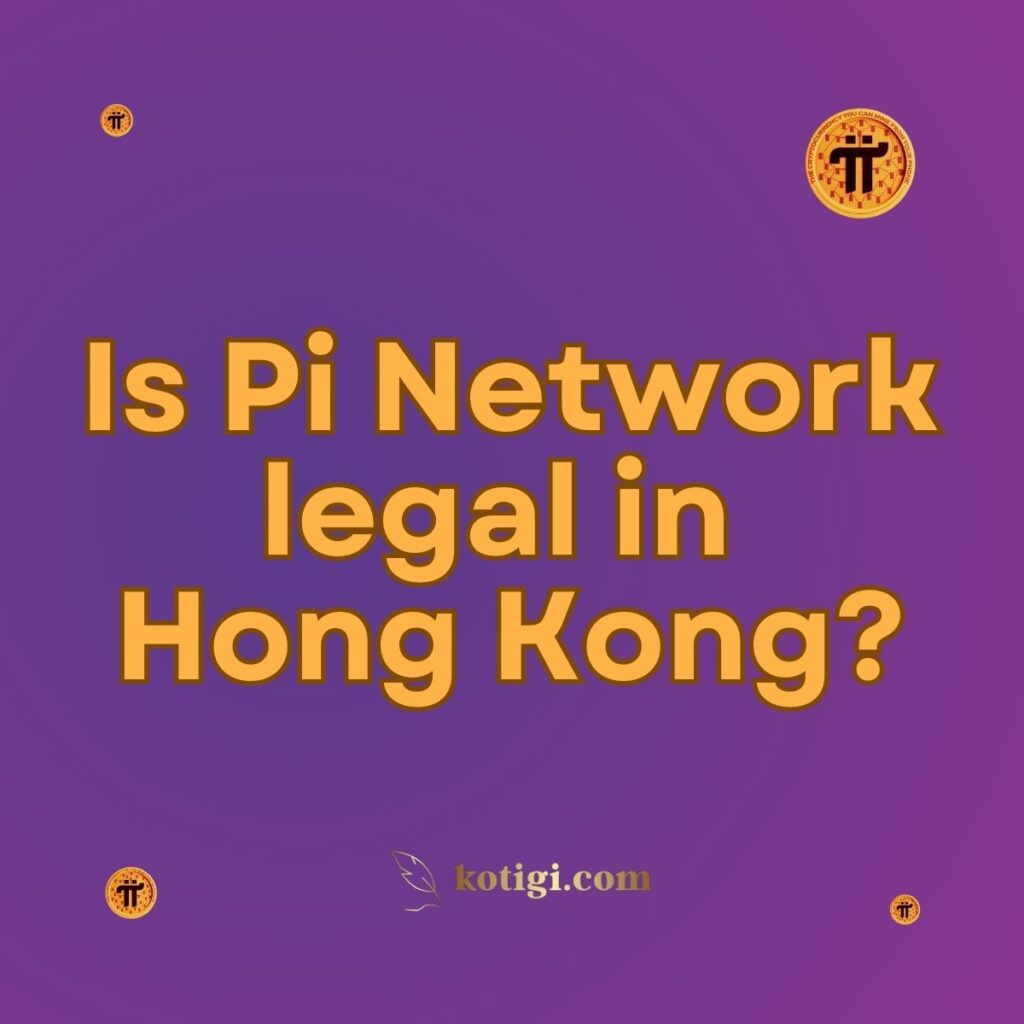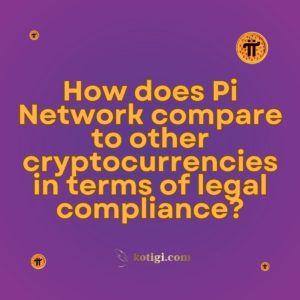
Is Pi Network legal in Hong Kong?
Pi Network operates in a legal gray area in Hong Kong, where cryptocurrency regulations are still evolving. While there is no specific law that bans Pi Network, it must comply with the region’s general cryptocurrency and financial regulations. Users should be aware of the potential legal obligations and risks when using Pi Network.
Introduction
Hong Kong is a significant global hub for finance and technology, making it an attractive location for cryptocurrency projects. As cryptocurrencies gain more popularity, questions surrounding their legal status have become increasingly important. In this article, we’ll examine whether Pi Network, a novel mobile cryptocurrency mining platform, is legal in Hong Kong and what implications its use might have for users in this region.
1. Overview of Cryptocurrency Regulations in Hong Kong
1.1 Legal Status of Cryptocurrencies
Cryptocurrencies are legal in Hong Kong, and the government has adopted a relatively open stance toward their use. However, they are not recognized as legal tender, meaning that while individuals are free to own and trade digital assets, they cannot be used as a substitute for Hong Kong dollars in official transactions. The regulatory framework primarily focuses on overseeing trading platforms and Initial Coin Offerings (ICOs), ensuring they comply with anti-money laundering (AML) and counter-terrorist financing (CTF) requirements.
1.2 Regulatory Authorities Involved
Hong Kong’s primary financial regulators, including the Securities and Futures Commission (SFC) and the Hong Kong Monetary Authority (HKMA), play a crucial role in overseeing cryptocurrency-related activities. While these authorities have yet to introduce specific guidelines concerning Pi Network, their general rules on crypto trading and financial conduct still apply.
1.3 Hong Kong’s Cryptocurrency-Friendly Environment
Hong Kong has fostered a relatively cryptocurrency-friendly environment compared to other regions. This allows platforms like Pi Network to function within the market, though they must comply with existing regulations. As a rapidly growing blockchain ecosystem, Pi Network’s decentralized nature and novel approach to mining using mobile phones might interest many in Hong Kong, but it is still subject to scrutiny, particularly regarding its legal and regulatory standing.
2. Compliance Requirements for Pi Network in Hong Kong
2.1 Anti-Money Laundering (AML) Regulations
The Anti-Money Laundering and Counter-Terrorist Financing Ordinance (AMLO) governs financial activities in Hong Kong, including cryptocurrency transactions. Although Pi Network is still in its pre-mainnet phase, any future transactions involving Pi coins may need to adhere to Hong Kong’s AML laws. Users should remain cautious, as the value of Pi coins might introduce new financial oversight requirements once it becomes tradable on exchanges.
2.2 Consumer Protection and User Verification
While Pi Network allows users to mine cryptocurrency on their mobile devices, it is essential to consider Hong Kong’s requirements for user verification and protection. Many cryptocurrency platforms must comply with Know Your Customer (KYC) procedures to mitigate the risk of fraud or illegal activities. Pi Network has already implemented KYC procedures for some users, which aligns with Hong Kong’s general approach toward user verification in financial services.
2.3 Regulations on Token Trading
Once Pi coins become tradable on open exchanges, Pi Network may face more regulatory scrutiny. Hong Kong regulators, particularly the SFC, oversee the activities of crypto trading platforms. These platforms are required to meet specific criteria to operate legally. It remains to be seen how Pi Network will structure its token trading system once it enters the mainnet phase, but it will likely need to comply with trading regulations if it wishes to operate in Hong Kong.
3. Potential Legal Risks for Pi Network Users
3.1 Unregulated Tokens and Market Volatility
Since Pi Network is still developing and has not yet fully launched, its tokens remain unregulated. This unregulated status poses a risk to users, as the legal framework around Pi Network could change once its tokens are traded publicly. Users must understand that Pi coins, while not illegal, could face future restrictions or regulatory measures that affect their ability to trade or use the tokens.
3.2 Consumer Protection Limitations
Cryptocurrency transactions often lack the consumer protections typically associated with traditional financial services. In Hong Kong, the authorities have repeatedly warned the public about the risks of trading digital currencies, citing issues such as price volatility, lack of transparency, and security risks. Pi Network users must be cautious of these risks, particularly since the platform is still in its developmental phase.
3.3 Tax Implications
Currently, there is no capital gains tax on cryptocurrency earnings in Hong Kong. However, if Pi coins are used in commercial activities, users might be liable for profits tax. If the value of Pi increases once it becomes tradable, users should be prepared for possible future tax obligations.
4. Government Stance on Cryptocurrency Mining
4.1 Mobile-Based Cryptocurrency Mining
Pi Network’s mobile mining model offers an energy-efficient alternative to traditional mining methods, which often require significant computing power. In Hong Kong, there are no specific laws regulating mobile-based cryptocurrency mining. However, users should still be mindful of potential regulatory changes as the Pi Network grows. The platform’s method of mining through smartphones makes it accessible to a broader audience, but it may face increased scrutiny if deemed to pose risks to financial stability or consumer safety.
4.2 Environmental Considerations
Traditional cryptocurrency mining has faced criticism for its environmental impact. Pi Network’s mobile-based approach is marketed as an eco-friendly alternative, which might resonate with Hong Kong’s push for more sustainable technologies. While environmental regulations do not currently target mobile mining, any future changes to energy consumption laws or environmental standards could impact how Pi Network operates in the region.
5. Future of Pi Network in Hong Kong
5.1 Potential for Regulation
While Pi Network currently operates without significant regulatory oversight, this may change as it grows and transitions to its mainnet phase. Hong Kong regulators have been keen on balancing innovation with security, particularly in the blockchain space. Pi Network’s future success in Hong Kong will largely depend on its ability to adapt to any emerging regulatory requirements, especially regarding token trading and consumer protection.
5.2 Public Interest and Adoption
Pi Network’s innovative approach has attracted widespread interest across the globe, including in Hong Kong. As the user base grows, local interest in Pi Network’s cryptocurrency ecosystem will likely increase. However, users should be aware that regulatory developments in Hong Kong could affect how the platform operates and its future legal standing in the region.
Conclusion
Pi Network’s legal status in Hong Kong remains subject to the region’s evolving cryptocurrency regulations. While there are no specific laws banning the platform, users must remain vigilant about future regulatory changes that could affect their participation. With cryptocurrency regulations still developing in Hong Kong, Pi Network has the potential to operate legally as long as it complies with general financial and consumer protection laws.
Key Takeaways
- Cryptocurrency is legal in Hong Kong, but regulations focus on financial compliance and consumer protection.
- Pi Network is not explicitly banned, but users must be aware of potential future regulations.
- Pi Network’s mobile mining model is not currently subject to specific mining laws in Hong Kong, but users should remain cautious of future legal developments.
- Consumer protection is limited for cryptocurrency users in Hong Kong, highlighting the need for caution when engaging with platforms like Pi Network.
- Future regulations may impact Pi Network once its tokens become tradable, particularly concerning token trading and financial oversight.





